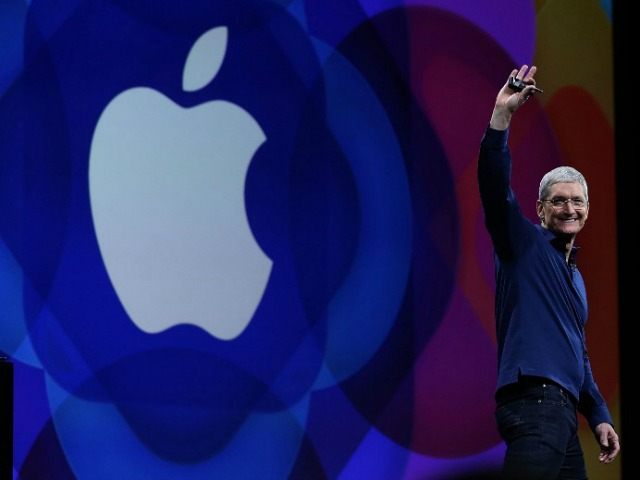The EU anti-trust regulator let Apple off easy with what amounts to a spectacular bargain by ruling that the company only owes $14.5 billion in taxes and interest through the infamous “Double Irish Flip.”
The European Union’s chief antitrust regulator ruled that Ireland must recoup roughly $14.5 billion unpaid taxes from Apple Inc., after ruling that a tax shelter with the Irish allowed the company to avoid almost all corporate tax across the entire bloc for more than a decade, according to the Wall Street Journal.
Apple, Facebook, Cisco Systems, Google and many other Silicon Valley multi-national corporations from the “Valley of the Democrats” are top Washington D.C. lobbyists and Hillary Clinton fundraisers. As such, the EU is headed toward a huge confrontation with the Obama administration, as the EU tax probes engulf a huge number of U.S. companies.
Breitbart News reported that the average American, who earns about $42,000 per year, is subject to some federal tax, but through a “loophole” in the interpretation of the U.S. tax code, which others call a fraud, allows multi-national corporations to avoid paying U.S. or EU income tax if the profit was earned in another country by a company’s overseas subsidiary.
Through what is referred to as the “Double Irish Flip,” large U.S. tech companies, mostly based in Silicon Valley but operating all over the world, have drastically cut their U.S. corporate statutory tax rate from 35 percent to as low as single digits, and also cut their EU corporate tax rate from about 23 percent to virtually zero.
To achieve the “flip,” a U.S. tech company first sets up an offshore subsidiary in a tax haven, like the Cayman Islands or the Bahamas. Then the U.S. company sets up an Irish company that is a subsidiary of the U.S. company and licenses some or usually all the U.S. company’s patents to a second Irish company that is a “tax resident” of Ireland.
The second Irish company receives income from the first Irish company’s patents. But as a tax resident of Ireland, all royalties or fees paid to the first company are deductible expenses under Irish law. Thus, the “flipped” U.S. company does not pay any federal taxes on the income from the Irish companies because the earnings were not “made” in the U.S.
The EU regulator calculated that between 1991 and 2007, Apple used the “Double Irish Flip” to only pay between 1 percent and almost zero taxes on its all its European profits in the decade from 2003 to 2014, by designating only a tiny portion of its profit to a taxable Irish branch.
Breitbart News reported that just before Clinton accepted the Democratic nomination for President, her economics advisor Nobel Prize Laureate Joseph Stiglitz, was asked how Apple could be encouraged to bring back to the U.S. the $215 billion of its total $232 billion in cash that is held in Ireland. Stigliz gave a honest response, agreeing that Apple is using a loophole in the U.S. tax system to shift its U.S. taxable earnings overseas to low-tax Ireland. As quoted by Bloomberg News, Stiglitz then shockingly stated: “Here we have the largest corporation in capitalization not only in America, but in the world, bigger than GM was at its peak, and claiming that most of its profits originate from about a few hundred people working in Ireland — that’s a fraud.”
The EU’s fine is the highest ever demanded under the EU’s longstanding state-aid rules that forbid corporations from achieving advantages over competitors because of crony government help.
Apple Chief Executive Tim Cook published an open letter to state that “Apple follows the law and we pay all the taxes we owe.”
Irish Finance Minister Michael Noonan commented, “I disagree profoundly with the Commission’s decision,” adding that the country would appeal the decision in order “to defend the integrity of our tax system.”
Wall Street analysts had expected up to a $30 billion bill for non-payment of tax and penalties, so Apple’s stock only fell about 2 percent. But every U.S. multi-national tech company’s shares could be in for a rough ride, as the EU taxman may look for up to another $50 billion in taxes from Silicon Valley multi-national corporation.

COMMENTS
Please let us know if you're having issues with commenting.